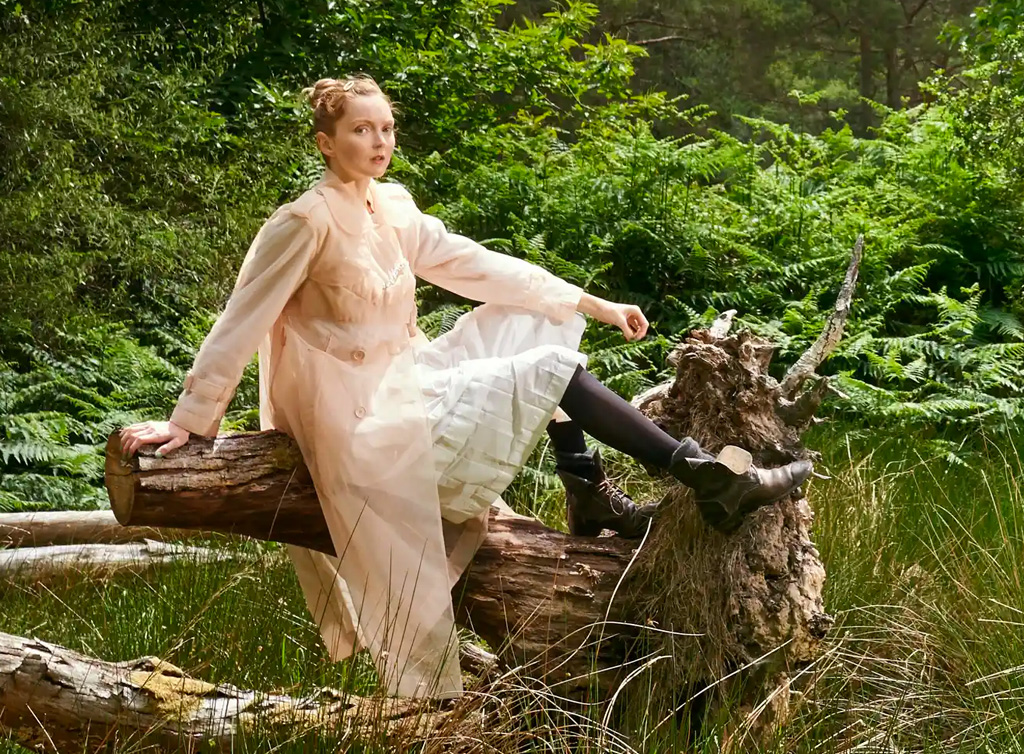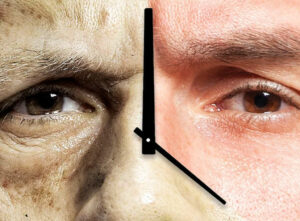I am tramping through the long grass of a Sussex nature reserve with supermodel-turned-activist Lily Cole. Beyond the gorse and the bracken, a vast open sky stretches before us. It certainly beats a sterile Zoom call. “How amazing is this?” she says. “I’ve been talking about moving to nature for years and then, finally, I decided to do it two years ago. I’ve been very grateful for it in general and particularly, obviously, these last few months.”
Cole, 32, has just rocked up on a big beast of an e-bike. Of course she is on a bike, though she could have as easily been driving her fancy electric Tesla car. The Tesla tech whiz Elon Musk is just one of the so-called “Wizards” she has interviewed for her book, Who Cares Wins: Reasons for Optimism in Our Changing World. The Wizards are the people who are using technology in an attempt to innovate us out of the environmental crisis. In the other camp are the “Prophets” who say we must cut back, travel less, consume less, simplify. Cole examines both approaches in the book.
Today Cole is in full Prophet mode in her “old, well-loved boots”, with her trademark flame-red hair tied in a top knot, but shaved underneath – an extremely beautiful hippie Prophet, dressed for comfort in jeans in a Conscious Exclusive bamboo fabric, T-shirt and cool round Wires sunglasses, a sustainable business she is involved with.
As for many of us, her lockdown has been an “emotional roller coaster” but she daren’t whinge: “I feel like we’re in such a privileged position here. I can’t complain.” She has been “baking a ton, gardening a ton”, making nut milks, doing yoga, enjoying slowing down and spending more time with her five-year-old daughter, Wylde.
So far, so hashtag blessed, and it would be easy to peg Cole as a virtue-signalling, silver-spooned bluestocking, but that would be to do her an injustice. Yes, her Uncle Adam was heir to a seat at the House of Lords (he turned it down to become a cinematographer, then a pioneer in sustainable energy), but Cole’s own upbringing was more frugal than gilded. She was born in Devon to a fisherman father and a mother who is an artist and writer; her parents split when she was seven weeks old. Cole was raised in London by her mother, who suffers from a rare genetic condition and was frequently unable to work. Her grandparents owned a farm in South Wales.
Cole was scouted outside a Soho burger bar by Storm Models when she was 14, and modelling was a dream ticket for her. In no time she was pulling sickies from school to work with the world’s most prestigious brands – Alexander McQueen, Louis Vuitton and Chanel to name but a few – and appearing on Vogue covers internationally.
But pretty soon she was grappling with the darker side of consumerism’s lurking complexities. At 15 she was (uncomfortably) wearing fur on the catwalk. By 17 she had found her voice. “Eventually saying no to fur cost me work, but it was a fairly straightforward choice to make: little boxes on contracts, usually appearing next to ‘No Nudity’”. A more complex decision came when she found herself caught up with the jewellery company De Beers, which had been accused of evicting the San people to mine diamonds in Botswana. The company denied any wrongdoing, but in a bold move for one so young, Cole refused to work for them and instead helped the San sell their own fair trade jewellery.
“This experience in Botswana marked me. I felt an enormous responsibility to understand and respect what I was selling. I wasn’t just buying the companies’ products, I was asking other people to buy them too,” she writes.
It’s telling that we still know Cole as a supermodel. Though she rarely models these days, her distinctive face and bright auburn hair are what we remember, yet modelling was only ever part of her story, a sideline, first to her academic life – she has a double first in history of art from Cambridge and got straights As in her A-levels – then to her entrepreneurial ventures and acting.
Her first role was in the 2007 remake of St Trinian’s, followed by Terry Gilliam’s The Imaginarium of Dr Parnassus, and in 2017 she played the Virgin Queen in Channel 5’s Elizabeth I. She has also stepped behind the camera to make a film about the plight of the refugees on the island of Samos, and has lent her time and profile to numerous charities and social enterprises.
“I’ve been quite lucky in that modelling is something you can do part-time, but ironically it’s the most visible part of my life, even though I spend less time doing it, because it only takes a few seconds to take a photo that’s then very visible and always there, in comparison, say, to the many months I might spend slogging behind a computer.”
In her latest incarnation as a writer, Cole spends the morning working and afternoons with her daughter. There has been no rigorous home-schooling. Cole is a fan of “the Scandinavian approach” and “preserving the sanctity of childhood” until the age of seven. Of course she is. But still she has been “finding ways to slip in lessons”, writing in a more playful way by making postcards for people and reading Philip Pullman’s Northern Lights.
In her book, Cole takes a deep dive into the issues surrounding gender equality and the environment. She mentions that when she was pregnant she wrote a Post-it Note contract, which was “part in jest (but in spirit very serious!)” agreeing to split the childcare 50/50 with her partner, tech-entrepreneur Kwame Ferreira.
The “contract” with Ferreira was prompted by an article she read that said most couples never discuss the division of childcare before their baby’s arrival. “It really rang out to me,” she says. So how is that working? Do they have a timetable? Does her partner stick to it? “I think it works really well – I’d highly recommend it. I’m not saying everyone has to make that choice or do the same division we decided on,” she says. “It’s not a rigid thing, more a loose understanding that we try to honour.”
Then, in a typically cerebral response, Cole spends a good five minutes explaining the philosophy behind this choice. “I’m not saying I’m against, in any form, women taking time out to look after their children; if that’s what they want to do it’s a beautiful decision to make. The point I’m making is, I think ideas about who is responsible for the children have a big impact on gender parity for women. I’m not saying there’s a ‘right’ way to do it; I’m encouraging parents to be conscious of what they want, rather than slipping into what their parents did. Or what their grandparents did.” She also mentions that she supports single motherhood and same-sex parenting. “Sorry – long answer,” she says. “But it’s important, right?”
As we tramp through the long grass, passing the odd dog walker, Cole nods hello. This is the other part of the countryside equation that she appreciates. But does she miss London at all? “I like being able to access it, but I don’t miss the daily experience. I feel like all my defences are up: it’s so urban and busy, and no one says hello. It’s a little bit more human here.”
Last year, Cole signed a letter in support of Extinction Rebellion, with other celebrities such as Jude Law, Jaime Winstone and Daisy Lowe, who work in fashion and film, jetsetting industries with huge carbon footprints – but Cole won’t be drawn into finger-wagging. The sensible answer would be to make the rich pay for their oversized carbon footprints, with a pollution tax on flights, as suggested by the campaign A Free Ride, she says. We could each have just one tax-free return flight a year.
Cole tries hard not to fly herself, “but without saying I’ll never fly again” because it’s more difficult to travel ethically than you think. After hearing Greta Thunberg speak in Stockholm, she attempted to come home by train. “But that route isn’t really designed for that. I fucked it up.” After two days, four train rides, a bus ride, a ferry crossing and a night sleeping in Copenhagen, she missed her last connection. In the end she booked a (very cheap) flight, offsetting it on Climeworks, and cried in frustration because she felt like a failure – but also because it seemed indicative of a wider problem. She had more luck travelling to Portugal on a bumpy, old-fashioned, 1980s sleeper train, which delighted her daughter with its fold-down beds and grey felt walls. “It was awesome, so much more memorable than travelling by plane.”
This is all very right-on of course, but Cole is able to laugh at herself (and frequently does). She is well aware of her privileged position.
Fearing criticism, she questioned whether she should even write the book at all. “I’m definitely not perfect, but then no one is,” she admits. “I think that’s a natural instinct that comes from a society that is quite tough on each other. But being tough does nothing but distract from the conversation and the effort. So you have to resist that. It would be nice if we were a bit more forgiving as a culture,” she says. She is now embracing the idea of being “an imperfect environmentalist”.
Cole’s first exposure to activism came at the age of eight, when her 16-year-old cousin, Emma, was photographed chained to a tree in newspapers. “I was, like, why is my cousin tied to a tree?” Emma has since said that she thinks this approach alienated people, that people looked at activists chained to trees and thought: “I’m not like that, so the environment isn’t something I need to care about.” Does Cole agree? “I can really understand what she was saying because you don’t want to create an ‘us’ and ‘them’ mentality. The reality we’re dealing with should make everyone an environmentalist. It’s something that concerns us all in the same way as Covid is something that concerns us all: the environment is similarly real. It’s really important to keep listening and to stay open-minded, because we’re all in this together, no one has the right answers. No one knows what’s right.”
What law would she introduce if she were prime minister for the day? “From an environmental point of view? Put a price on pollution.” A similar tax caused uproar in France, when fuel tax riots engulfed Paris in 2018. “But the devil is in the detail right? They didn’t design it in the right way, so it impacted people financially. But there are examples, like Canada, where it’s well designed and doesn’t penalise poorer communities, and can even offer wealth redistribution, with the tax redistributed equally among citizens, so the less you pollute the more you make.”
The ink was just drying on her book when Covid-19 hit. She has spent part of lockdown rewriting the preface, but does she think we will take this chance to finally pivot, to let nature bounce back? “We’ve yet to see what will happen with Covid. Whether it will be a distraction, because we’re focused on a new set of problems or whether it will compound it. I hope it compounds it because we’ve already started experiencing some of the things scientists have been warning about for years.” Like the bushfires? “Yes and Covid itself is a result of the way we’re interacting with the natural world, the way we’re industrialising animal agriculture – and that’s not a conversation that’s in the mainstream.”
On her bleakest days Cole says she soothes herself with the thought that if we don’t get our climate sorted the Earth will carry on regardless. “What’s the worst-case scenario? Just that we’re going to wipe ourselves out, along with other species, but the world will no doubt bounce back and there might even be more interesting creatures that emerge instead of us.”
Fashion’s best lesson – an extract from Who Cares Wins by Lily Cole
Unless you live in an entirely self-sufficient way, everything we touch, eat and use is connected to a complex web of trade relationships that we are responsible for being part of. When we make a purchase, we are explicitly supporting that way of doing business by giving a company our money; we are funding them keeping going.
Of course, the power of money lies not just in how you spend it, but also in how you earn it, save it and invest it. Many of us want to earn our money working for – or setting up – companies that are looking to solve problems. Employees often have the greatest leverage to change the working practices inside companies, and there has been a boom in social businesses and new legal structures that seek to remodel a new vision of capitalism. My journey in thinking about these issues began when I was plunged head first into the epicentre of consumerism: fashion.
I was always a fairly material girl: I remember trawling Portobello Market from a very young age, begging my mum to buy me a trinket. I had a penchant for dressing up, and second-hand clothes were my palette. Mum’s answer was usually no, met by hysteria. But sometimes she would give in and buy it.
Then a store opened in Kilburn selling new clothes at unbelievably cheap prices: T-shirts for £1, dresses for £3. I saved my Christmas money and would fill up one of their big baskets until it was so heavy I could barely lift it. I never considered how clothes could be made so cheaply. It was as if they had dropped from heaven.
And one day, my life changed. I was walking in Soho with friends when a man approached us, holding a little white card and said something about modelling. I pocketed the card and let my heart spring under a cautious face.
My mum took me into the modelling agency the first time. I was given a big blue book, which would be filled with pictures of me: I was to become my own travelling saleswoman. I had just turned 14 and the blue book was heavy with possibilities.
Fashion offered a fairytale for my inner child, and initially I indulged it without question. I made money and friends, and fulfilled my dream of travelling. Yet it also offered me a surprising gift: an education in capitalism.
Who Cares Wins: Reasons for Optimism in Our Changing World by Lily Cole (Penguin Life , £20) is out on 30 July. Buy it from guardianbookshop.com for £17




